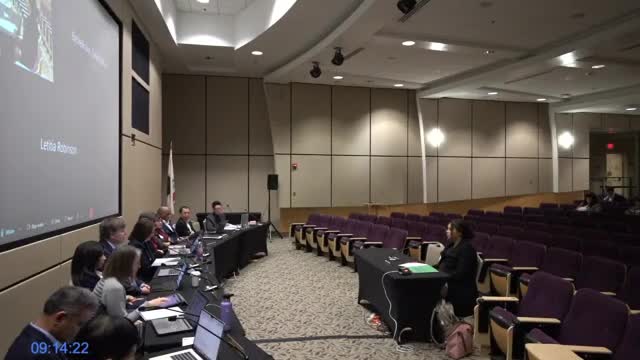Medical Board of California directs staff to study notice options after debate over posting physician investigations
Get AI-powered insights, summaries, and transcripts
Subscribe
Summary
At its quarterly meeting in Fresno the Medical Board of California considered a board-member legislative proposal to place a public notice on a physician—s profile when a case reaches the Health Quality Investigation Unit (HQIU) and voted to direct staff to study options.
At its quarterly meeting in Fresno the Medical Board of California considered a board-member legislative proposal to place a public notice on a physician—s profile when a case reaches the Health Quality Investigation Unit (HQIU). The board voted to direct staff to research how the Contractor State License Board implements its disclosure statute, to review other jurisdictions, and to drill down on the board—s complaint timeline to identify where a notice might legally and practically be feasible.
Board member TJ Watkins presented the proposal and said, "Can we agree that 3 years to wait to see anything about a doctor that is being investigated is too long?" He urged the board to provide earlier public notice after the case had progressed beyond initial screening. Watkins said his proposal was intended to "inform the public" and not to "prosecute or persecute" licensees.
Several board members raised concerns about fairness and due process. Doctor Helzer said, "is it appropriate for us to publish, issues on our profile website without first, vetting all of the complaints and making sure that they're, substantiated before and that we're ready to proceed with with an accusation before publishing them." Board members and staff discussed the current process, with one staff speaker noting that historically about 3.8 percent of complaints lead to an accusation.
Public commenters included patient advocates who urged earlier disclosure. Marion Hollingsworth, a patient safety advocate, said the board had left patients "totally in the dark" in at least one case and that she felt betrayed by the board—s timeline. Charles Johnson, who said his wife died after a routine surgical procedure, told the board, "Please step up. Support this action resoundingly."
The California Medical Association (CMA) opposed public disclosure of unsubstantiated complaints, saying the board received nearly 10,000 complaints in fiscal year 2023–24 and that "97% of cases did not lead to accusation," and cautioned that posting unverified complaints would be "misleading and highly prejudicial." The CMA requested the board continue its practice of disclosing only information that is part of a filed accusation.
After discussion, Doctor Tsai moved to direct staff to gather more information from the Contractor State License Board about its disclosure statute and to review other jurisdictions and to analyze the board's own complaint-processing timeline to identify feasible points for notice; the motion was seconded. The roll-call vote was unanimous: all voting members present voted yes. The motion carried.
The board did not adopt any legislative text at this meeting; the action was a directive to staff to collect information and return with analysis. Board members repeatedly said they wanted a more complete staff analysis, including legal review and statistics on case flow, before considering a rule change or legislative proposal.
The written materials for the proposal were included in the meeting packet (BRD-13-3). The board scheduled no immediate rule or statutory change and instead directed staff to return with the requested information.
